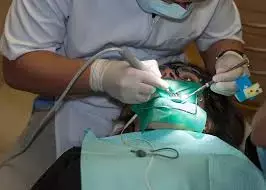- Home
- Medical news & Guidelines
- Anesthesiology
- Cardiology and CTVS
- Critical Care
- Dentistry
- Dermatology
- Diabetes and Endocrinology
- ENT
- Gastroenterology
- Medicine
- Nephrology
- Neurology
- Obstretics-Gynaecology
- Oncology
- Ophthalmology
- Orthopaedics
- Pediatrics-Neonatology
- Psychiatry
- Pulmonology
- Radiology
- Surgery
- Urology
- Laboratory Medicine
- Diet
- Nursing
- Paramedical
- Physiotherapy
- Health news
- Fact Check
- Bone Health Fact Check
- Brain Health Fact Check
- Cancer Related Fact Check
- Child Care Fact Check
- Dental and oral health fact check
- Diabetes and metabolic health fact check
- Diet and Nutrition Fact Check
- Eye and ENT Care Fact Check
- Fitness fact check
- Gut health fact check
- Heart health fact check
- Kidney health fact check
- Medical education fact check
- Men's health fact check
- Respiratory fact check
- Skin and hair care fact check
- Vaccine and Immunization fact check
- Women's health fact check
- AYUSH
- State News
- Andaman and Nicobar Islands
- Andhra Pradesh
- Arunachal Pradesh
- Assam
- Bihar
- Chandigarh
- Chattisgarh
- Dadra and Nagar Haveli
- Daman and Diu
- Delhi
- Goa
- Gujarat
- Haryana
- Himachal Pradesh
- Jammu & Kashmir
- Jharkhand
- Karnataka
- Kerala
- Ladakh
- Lakshadweep
- Madhya Pradesh
- Maharashtra
- Manipur
- Meghalaya
- Mizoram
- Nagaland
- Odisha
- Puducherry
- Punjab
- Rajasthan
- Sikkim
- Tamil Nadu
- Telangana
- Tripura
- Uttar Pradesh
- Uttrakhand
- West Bengal
- Medical Education
- Industry
Use of higher concentrations of NaOCl as irrigant during RCT linked to postendodontic pain, suggests study

Use of higher concentrations of NaOCl as irrigant during RCT linked to postendodontic pain, suggests a study published in the Journal of Endodontics.
This study systematically reviewed literature regarding the effect of different concentrations of sodium hypochlorite (NaOCl) used during root canal treatment (RCT) on postendodontic pain (PEP) and rescue analgesia. Following registration with PROSPERO (CRD42023388916), a search was conducted using PubMed, Scopus, Web of Science, and Embase databases. Randomized controlled trials of patients receiving RCT which assessed PEP at different time intervals were included. Following data extraction and Cochrane risk of bias assessment 2, meta-analyses were performed to evaluate PEP during the first 48 hours along with rescue analgesic intake. The certainty of the evidence was evaluated using the Grading of Recommendations, Assessment, Development, and Evaluation approach.
Results: Five randomized controlled trials with 674 patients were included. One study exhibited a low risk of bias, while 4 raised some concerns. Patients treated with low concentrations of NaOCl (≤3%) were significantly less likely to report PEP at 24 hours (OR = 2.32; [95% CI, 1.63–3.31]; P < .05) and 48 hours (OR = 2.49; [95% CI, 1.73–3.59]; P < .05) as compared with high concentrations of NaOCl (≥5%). Furthermore, with low concentrations of NaOCl, significantly lesser moderate-severe PEP was reported at 24 hours (OR = 2.32; [95% CI, 1.47–3.62]; P < .05) and 48 hours (OR = 2.35; [95% CI, 1.32–4.16]; P < .05) and lesser analgesia was needed (OR = 2.43; [95% CI, 1.48–4.00]; P < .05).
While PEP can be influenced by several factors, low certainty evidence suggests that when NaOCl is used as an irrigant during RCT, PEP may be less likely with lower concentrations of NaOCl. Moderate certainty evidence indicates that lesser analgesia may be required with lower concentrations of NaOCl. These results should be cautiously interprete
Reference:
Sodium Hypochlorite Concentration and Postendodontic Pain - Unveiling the Optimal Balance: A Systematic Review and Meta-Analysis. Prasad, Niharika et al.. Journal of Endodontics, Volume 50, Issue 9, 1233 - 1244
Dr. Shravani Dali has completed her BDS from Pravara institute of medical sciences, loni. Following which she extensively worked in the healthcare sector for 2+ years. She has been actively involved in writing blogs in field of health and wellness. Currently she is pursuing her Masters of public health-health administration from Tata institute of social sciences. She can be contacted at editorial@medicaldialogues.in.
Dr Kamal Kant Kohli-MBBS, DTCD- a chest specialist with more than 30 years of practice and a flair for writing clinical articles, Dr Kamal Kant Kohli joined Medical Dialogues as a Chief Editor of Medical News. Besides writing articles, as an editor, he proofreads and verifies all the medical content published on Medical Dialogues including those coming from journals, studies,medical conferences,guidelines etc. Email: drkohli@medicaldialogues.in. Contact no. 011-43720751


